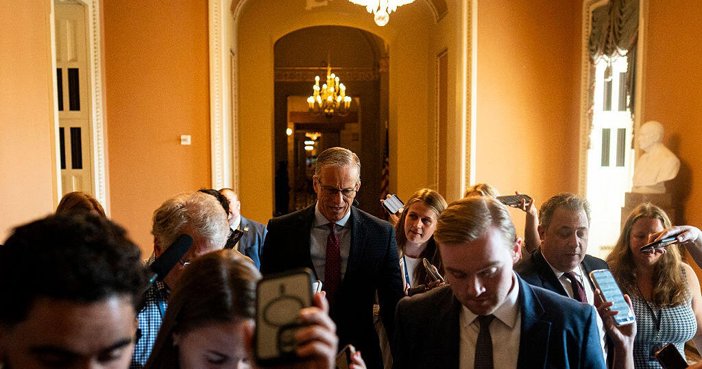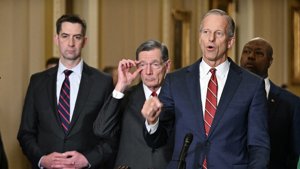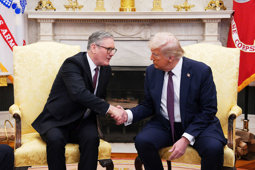
Trump’s Senate Bill Survives Senate Test Vote
Trump’s “big, beautiful bill” passes Senate test vote, sparking partisan Medicaid battle, marathon debate, and late-night negotiations.
Senate Clears Hurdle for Trump’s Signature Legislation
President Donald Trump’s sweeping “big, beautiful bill” cleared a critical procedural hurdle in the Senate on Saturday night, advancing to a marathon stretch of debate and amendments amid sharp divisions both within and between parties. The high-stakes 51-49 vote, almost strictly along party lines, saw only Republican Senators Thom Tillis of North Carolina and Rand Paul of Kentucky join Democrats in opposition, highlighting deep internal rifts over issues like Medicaid reforms and tax provisions.
Senator Ron Johnson, R-Wis., who flipped his vote from a ‘no’ to a ‘yes,’ called the legislation a “necessary first step” toward restoring fiscal discipline and addressing deficits left by the previous administration. Trump celebrated the result as a “great victory,” publicly praising Republican allies and framing the bill as essential for economic growth, border security, and budget control.
Democratic Resistance, Delay Tactics, and Medicaid Divide
Senate Democrats, led by Minority Leader Chuck Schumer, condemned the bill as a “radical” and secretive overhaul, objecting to what they described as rushed proceedings and lack of transparency. Schumer forced Senate clerks to read aloud the entire 940-page bill—a tactic that dragged out the process for nearly 16 hours and set the stage for 20 hours of further debate, equally split between both parties.
Medicaid reforms emerged as a central flashpoint. Republicans such as Sen. Jim Banks argued the bill’s changes target able-bodied adults who do not work, emphasizing that the reforms would prevent future tax hikes for working families and end Medicaid eligibility for undocumented immigrants. Democrats, including Sen. Chris Coons, countered that the $900 billion in proposed cuts would impose onerous requirements, raise healthcare costs, and threaten coverage for millions. “Don’t believe me—listen to Senator Tom Tillis,” Coons advised, referencing the North Carolina Republican who opposed the bill over its projected impact on the middle class.
Amid the contentious debate, Trump criticized both Tillis and Paul for their opposition. Shortly after the vote, Tillis announced he would not seek reelection, further illustrating the intra-party strain and political consequences of the high-profile legislative battle.
Internal GOP Negotiations and Controversial Land Sale Provision
The Senate’s path to this pivotal moment was marked by late-night negotiations, amendments, and policy reversals. One of the most controversial provisions—a mandate to sell millions of acres of federal land for development—was preemptively withdrawn by Sen. Mike Lee, R-Utah, after facing bipartisan backlash and Senate parliamentarian objections. Lawmakers from Western states, including Idaho and Montana, denounced the provision, arguing for improved land management rather than privatization.
With the delay tactics now exhausted, both parties are set for a marathon “vote-a-rama,” offering unlimited amendments before a final passage vote. Fiscal hawks in the GOP have pressed for deeper Medicaid cuts, while moderates demand protection for state interests and rural healthcare funding.
Looking Ahead: Uncertain Fate and Looming Deadline
The legislative scramble is fueled by a July 4 deadline set by President Trump, who has made passage of the bill a centerpiece of his domestic agenda. The outcome remains far from certain, with the bill needing to survive final Senate passage before being sent to the House. Lawmakers are racing to reconcile divergent priorities on taxes, healthcare, land management, and spending as the window for negotiation rapidly narrows.
The fierce debate, procedural brinkmanship, and shifting alliances underscore the high stakes in Washington as Trump and congressional leaders seek to reshape the nation’s fiscal and policy landscape ahead of the Independence Day holiday.






